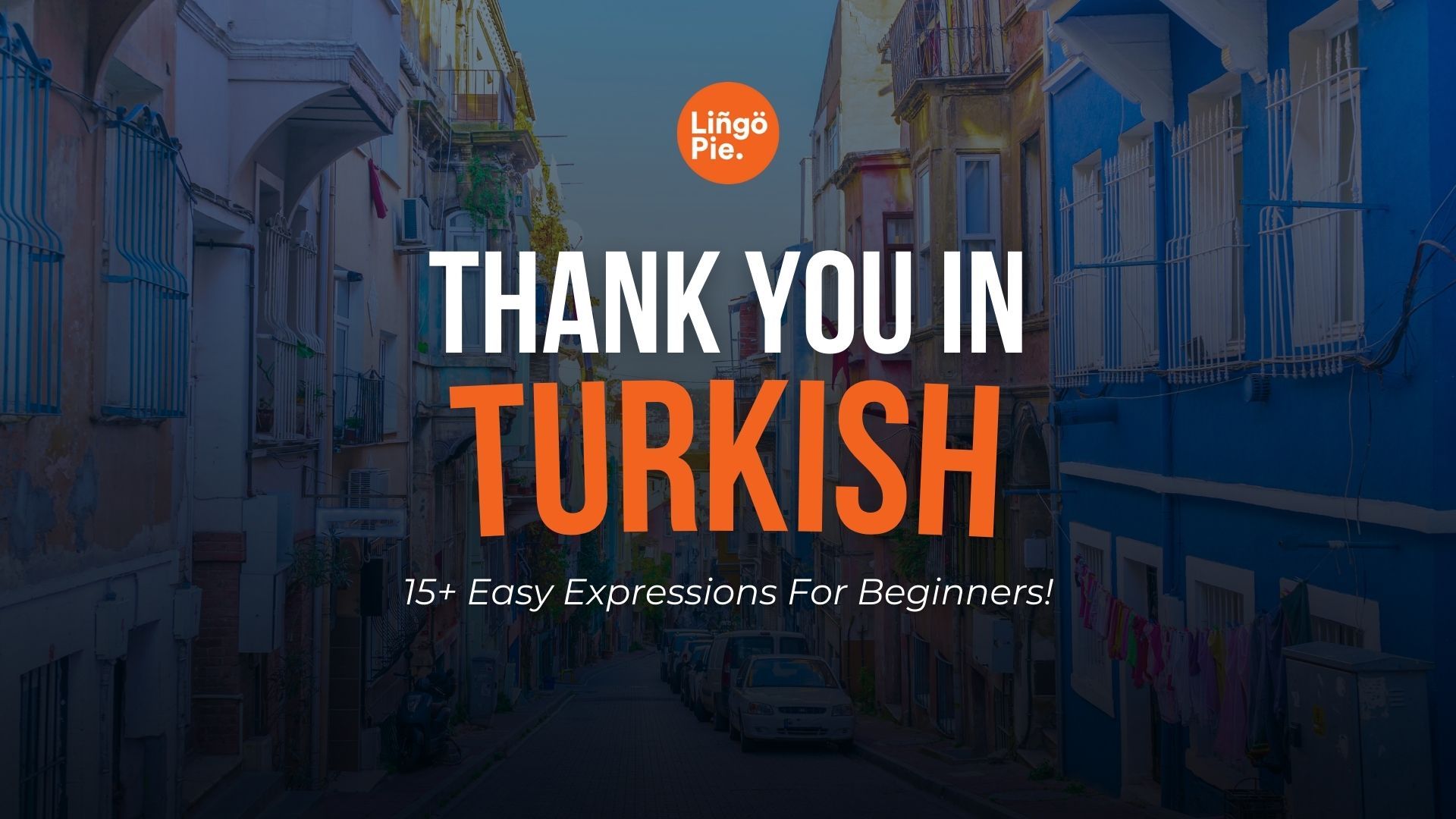Ever wondered how much easier life gets when you know essential phrases in another language?
Turkish is spoken by millions of people, and picking up some common phrases can make your interactions smoother, whether you're learning Turkish or chatting with Turkish friends.
As a native Turkish speaker, I’ve seen how even just a few simple words can make a huge difference in conversations.
In this post, I’ll walk you through some basic Turkish phrases that will help you get by in everyday situations, like ordering food, asking for directions, or just saying hello.
Plus, I’ll share some unique expressions that give you a little taste of Turkish culture!
- How To Say Thank You In Turkish?
- Gaming Terms In Turkish
- Curse Words In Turkish

1. Turkish Phrases For Greeting
When you're just starting with Turkish, learning some basic phrases can be a lifesaver. Whether you're greeting someone or showing politeness, these phrases will help you navigate everyday conversations with ease.
These are the go-to phrases when meeting people or saying goodbye:
| English | Turkish |
|---|---|
| Hello | Merhaba |
| Hi | Selam |
| Good morning | Günaydın |
| Good day | İyi günler |
| Good afternoon | Tünaydın |
| Good evening | İyi akşamlar |
| Goodnight | İyi geceler |
| Bye-bye | Baybay |
| Goodbye | Hoşçakal |
| See you | Görüşürüz |
| Take care of yourself | Kendinize iyi bakın |
Read Also:

2. Turkish Phrases For Small Talk

Small talk is a great way to break the ice and connect with others, whether you're meeting new people in Turkey or just practicing your Turkish skills. Knowing a few essential phrases can help you start conversations, show interest, and engage with those around you.
Here are some useful Turkish phrases for small talk that will make your interactions smoother:
| English | Turkish | ||||||||||||||||||||||||||||||||||||||||||||||||||||||||||||||||||||||||||||||||||||||||
|---|---|---|---|---|---|---|---|---|---|---|---|---|---|---|---|---|---|---|---|---|---|---|---|---|---|---|---|---|---|---|---|---|---|---|---|---|---|---|---|---|---|---|---|---|---|---|---|---|---|---|---|---|---|---|---|---|---|---|---|---|---|---|---|---|---|---|---|---|---|---|---|---|---|---|---|---|---|---|---|---|---|---|---|---|---|---|---|---|---|
| How are you? | Nasılsın? | ||||||||||||||||||||||||||||||||||||||||||||||||||||||||||||||||||||||||||||||||||||||||
| I am doing well, how are you? | İyiyim sen nasılsın? | ||||||||||||||||||||||||||||||||||||||||||||||||||||||||||||||||||||||||||||||||||||||||
| How’s it going? | Nasıl gidiyor? | ||||||||||||||||||||||||||||||||||||||||||||||||||||||||||||||||||||||||||||||||||||||||
| What’s up? | Ne haber? | ||||||||||||||||||||||||||||||||||||||||||||||||||||||||||||||||||||||||||||||||||||||||
| Where are you from? | Memleketiniz neresi? | ||||||||||||||||||||||||||||||||||||||||||||||||||||||||||||||||||||||||||||||||||||||||
| How is your family? | Ailen nasıl? | ||||||||||||||||||||||||||||||||||||||||||||||||||||||||||||||||||||||||||||||||||||||||
| They are well. | İyiler. | ||||||||||||||||||||||||||||||||||||||||||||||||||||||||||||||||||||||||||||||||||||||||
| Where are you from? | Nerelisin? | ||||||||||||||||||||||||||||||||||||||||||||||||||||||||||||||||||||||||||||||||||||||||
| I am from Europe. | Avrupalıyım. | ||||||||||||||||||||||||||||||||||||||||||||||||||||||||||||||||||||||||||||||||||||||||
| Where do you live? | Nerede yaşıyorsun? | ||||||||||||||||||||||||||||||||||||||||||||||||||||||||||||||||||||||||||||||||||||||||
| I live in _. | ___da/ta/de/te yaşıyorum. | ||||||||||||||||||||||||||||||||||||||||||||||||||||||||||||||||||||||||||||||||||||||||
| English | Turkish |
|---|---|
| Hello, I’m _ | Merhaba, ben _ |
| I’m glad to meet you | Memnun oldum |
| Me too | Ben de |
| How are you? | Nasılsınız? |
| I’m fine, thank you. And you? | İyiyim, teşekkür ederim, ya siz? |
| Where are you from? | Nerelisiniz? |
| I’m from _ | Ben ___lıyım |
| How old are you? | Kaç yaşındasınız? |
| I’m _ years old | Ben _ yaşındayım | My name is _. | Benim adım _. |
| What is your name? | Senin adın ne? |
4. Turkish Phrases For Dining And Shopping
If you’re planning to eat out or do some shopping in Turkey, having the right phrases handy can make your experience smoother and more enjoyable.
Here are some key Turkish phrases to help you in restaurants and while shopping:
| English | Turkish |
|---|---|
| May I see the menu? | Menüyü görebilir miyim? |
| May I have _ , please? | _ alabilir miyim lütfen? |
| Bill, please! | Hesap lütfen! |
| Where is the mall? | Alışveriş merkezi nerede? |
| What size is this? | Bu kaç beden? |
| Can I pay by credit card? | Kredi kartı ile ödeyebilir miyim? |
Read Also:

5. Phrases for Travel and Directions
When traveling around Turkey, being able to ask for directions or navigate public transport is a huge help. Here are some essential phrases to keep you on the right track.
| English | Turkish |
|---|---|
| Where am I? | Neredeyim? |
| Can you give me directions? | Bana yol tarif eder misiniz? |
| Excuse me, how can I get to _? | Pardon, _’ya nasıl gidebilirim? |
| Which bus goes from here? | Hangi otobüs buradan geçiyor? |
| I want to buy a ticket. | Bilet almak istiyorum. |
6. Turkish Question Words
Asking questions is a fundamental part of any conversation and helps you gather information and connect with others. Knowing how to ask questions in Turkish can significantly enhance your communication skills and allow you to engage more deeply with native speakers.
Here are some essential Turkish question words that will help you navigate conversations and get the information you need:
| English | Turkish |
|---|---|
| Who? | Kim? |
| What? | Ne? |
| When? | Ne zaman? |
| At what time? | Kaçta? |
| How? | Nasıl? |
| Where? | Nerede? |
| Why? | Neden? |
| Why? | Niye? |
| Why? | Niçin? |
| How much? | Ne kadar? |
| How many? | Kaç tane? |
| What’s happening? | Ne oluyor? |
| What’s the matter? | Neyin var? |
7. Turkish Phrases For Communication

Effective communication is key when you're navigating a new language, and knowing some basic phrases can make a world of difference. Whether you're in a conversation with a local or trying to understand instructions, these phrases will help bridge the language gap and enhance your interactions.
Here are some essential Turkish phrases that will assist you in communicating effectively, even if you're still learning the language:
| English | Turkish |
|---|---|
| Do you speak English? | İngilizce konuşuyor musunuz? |
| Can you speak slowly, please? | Yavaş konuşabilir misiniz lütfen? |
| I don’t speak Turkish. | Türkçe bilmiyorum. |
| I don’t understand. | Anlamıyorum. |
| How do you say _ in Turkish? | Türkçe de _ nasıl diyorsunuz? |
8. Cultural Insights
Language is more than just words—it’s a reflection of culture, and Turkish is no exception. Certain phrases in Turkish offer a glimpse into the country’s values, traditions, and social norms.
Greetings as a Sign of Respect
In Turkish culture, greetings are a big deal. Whether you're meeting someone for the first time or passing by a neighbor, saying "Merhaba" (Hello) is a way to show respect. Polite expressions like "Nasılsınız?" (How are you?) aren't just pleasantries—they're genuine questions that reflect the Turkish value of hospitality and concern for others' well-being.
Politeness and Gratitude
Using "Lütfen" (Please) and "Teşekkür ederim" (Thank you in Turkish) isn’t optional; it's expected. These phrases show respect and appreciation, which are central to interactions in Turkish society. Turks take pride in politeness, so mastering these expressions will go a long way in creating positive connections.
Farewells with Warmth
Saying goodbye in Turkey is often accompanied by well-wishes, like "Güle güle" (Goodbye). This expression, used by the person staying behind, literally means “go with a smile,” reflecting the warmth and friendliness that is common in Turkish culture.
Read Also:

9. Fun and Unique Turkish Phrases
One of the most enjoyable parts of learning Turkish is discovering the quirky idiomatic expressions and colloquialisms that make the language so colorful. Here are a few fun and unique Turkish phrases that will not only boost your fluency but also give you insight into Turkish humor and culture.
1. "Göz var nizam var." – There’s order in the eye.
This expression is used when something is clearly visible or logical. It’s like saying, “You can see it with your own eyes; it’s obvious!”
2. "Kolay gelsin." – May it come easy.
This phrase is commonly used when you see someone working, to wish them an easy time. It’s a polite and friendly way to acknowledge someone's efforts.
3. "Damlaya damlaya göl olur." – Drop by drop, a lake forms.
This saying emphasizes the importance of patience and consistency. Small efforts, over time, can lead to big outcomes.
4. "Kafa ütülemek." – To iron someone’s head.
This funny phrase means to annoy someone by talking too much or nagging. It’s similar to the English saying, “to talk someone’s ear off.”
5. "Çok yaşa!" – Live long!
This is the Turkish equivalent of “bless you” when someone sneezes, but it literally means "live long," a heartfelt wish for health and longevity.
These phrases not only add flavor to your Turkish but also give you a peek into Turkish speakers' everyday humor and warmth!
Final Thoughts
In this article, we talked about some important Turkish phrases that can help you in everyday conversations, small talk, and introductions. These phrases are great for anyone who wants to improve their Turkish, whether you're visiting Turkey, making new friends, or just practicing the language.
Now if you're serious about mastering Turkish, then I highly recommend that you try out the Lingopie! Lingopie is a VOD platform that allows you to learn Turkish and other foreign languages through hit TV shows and movies. The best part? It's available for FREE for 7 days! Give it a try now.
Frequently Asked Questions
1. How to speak basic Turkish?
To speak basic Turkish, start by learning common phrases and vocabulary, such as greetings and polite expressions. Practice pronunciation and try to use simple sentences in everyday conversations. Language apps and online resources can also help you learn quickly.
2. What is a typical Turkish greeting?
A typical Turkish greeting is "Merhaba," which means "Hello." For a more casual greeting, you can say "Selam," which means "Hi." When meeting someone, it’s polite to ask, "Nasılsın?" meaning "How are you?"
3. How to be polite in Turkish?
To be polite in Turkish, always say "Lütfen" for "Please" and "Teşekkür ederim" for "Thank you." Using polite forms of address, like "Bey" for Mr. and "Hanım" for Mrs., is also appreciated.
4. What do Turks say after eating?
After eating, Turks often say "Afiyet olsun," which means "Bon appétit" or "Enjoy your meal." It’s a way to show appreciation for the food and the effort put into making it.











